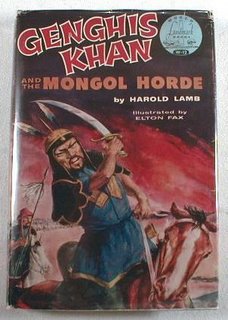“Where is your son serving in the army?” we asked.
“My son Ulzii is an officer in Baishint. You may perhaps know him,” replied Damba and showed us a photograph taken from the wooden box. The photo had the image of a Russian and a Mongolian soldier.
“Which of them is your son?” we asked jokingly.
“They are both my sons,” Doulma said, “the Russian and the Mongolian alike. This Russian fought alongside my son at Khalkhiin Gol* and he carried my son when he was wounded on the battlefield. Now my son Ulzii constantly corresponds with this Russian boy.”
The old man kept silent as if thinking, and looking at the photograph he exclaimed sadly: “These photos are a wonder! The image remains forever. It was a sad pity that photographs were not taken when we were on the battlefield.”
The old man’s face shone with joy when we asked him, “Did you ever go to war?”
“A Russian officer gave me this sword,” said he, showing a sword. “He was one of those brave comrades who was fighting for the freedom and happiness of our Mongolians. I think he is now fighting the German fascists...
“After hunting marmots for my family, I joined the people’s partisans with the only horse I had then.
“Since then the Mongolian nation has been changing before my eyes. Our life is improving as the nation is moving forward. Now I own about twenty horses, thirty cows and a hundred sheep...”
*Khalkhiin Gol – in 1939, imperialist Japan waged a war against Mongolia and was defeated
--Ts.Damdinsuren, “They Are Both My Sons,” 1943, translated by Ch.Burenbayar
Friday, February 23, 2007
Sunday, February 18, 2007
Jon loaned me this book and it's pretty good
“He visited my class, we set some poetry readings up for him, and we set up his Free University meeting room and place. I think the title of the class we said he would teach was Tantric Yoga—no it was Telepathic Communication. His class was a tremendous success, though not because of his lecturing on telepathy. The first night he was supposed to teach it, we walked with him to the student union building. The room was on the first floor and was packed with people sitting quietly, intently, as though waiting for Jim Jones to pass the Kool-Aid. Either it was that or something else, something false, levy picked up on, and he simply walked on by the door and out the side. I thought for a moment of going in and telling them it was another no-show, but what the hell. We all walked over to the 602 Club and then thought no more about it, until Ann Krooth told me that levy’s class was one of the most successful in all the Free University. People there assumed he was trying to reach them telepathically, and many of them heard him, as they sat there, meditating in the classroom. That class went on for several months after levy had returned to Cleveland—months after levy was no longer alive.”
--Morris Edelson in “Portrait of a Young Man Trying to Eat the Sun (the life, legend, & mysterious death of d. a. levy)” by Mike Golden, first published in BEET magazine in 1994, collected in The Outlaw Bible of American Essays
--Morris Edelson in “Portrait of a Young Man Trying to Eat the Sun (the life, legend, & mysterious death of d. a. levy)” by Mike Golden, first published in BEET magazine in 1994, collected in The Outlaw Bible of American Essays
Labels:
books,
education,
Jon,
quotations,
suicide
Thursday, February 15, 2007
Happy Valentines Two Days Ago!
Tell me, dearest, what is love?
'Tis a lightning from above;
'Tis an arrow, 'tis a fire,
'Tis a boy they call Desire.
'Tis a grave
Gapes to have
Those poor fools that long to prove.
Tell me more, are women true?
Yes, some are, and some as you.
Some are willing, some are strange,
Since you men first taught to change.
And till troth
Be in both,
All shall love, to love anew.
Tell me more yet, can they grieve?
Yes, and sicken sore, but live:
And be wise, and delay,
When you men are as wise as they.
Then I see,
Faith will be,
Never till they both believe.
--John Fletcher, 1613?
'Tis a lightning from above;
'Tis an arrow, 'tis a fire,
'Tis a boy they call Desire.
'Tis a grave
Gapes to have
Those poor fools that long to prove.
Tell me more, are women true?
Yes, some are, and some as you.
Some are willing, some are strange,
Since you men first taught to change.
And till troth
Be in both,
All shall love, to love anew.
Tell me more yet, can they grieve?
Yes, and sicken sore, but live:
And be wise, and delay,
When you men are as wise as they.
Then I see,
Faith will be,
Never till they both believe.
--John Fletcher, 1613?
Wednesday, February 07, 2007
Sunday, February 04, 2007
Thirty-two marks of the Buddha
Subscribe to:
Posts (Atom)






